As I write this, many thousands of people have been directly affected by the COVID-19 coronavirus, including members of my family. It is not a time for glib comments. But millions of people face the prospect of working from home for the first time. Likewise, many managers and many companies are going to have to learn how to make remote working work for them. This article is for them.
I have been working remotely since 2000 and my businesses, Turbine and Articulate Marketing, are both remote working organisations with nearly 20 staff working across the UK and Europe. I thought it would be helpful if I shared what I have learned and shared some resources and tips for managers and bosses who are doing it for the first time.
Top resources for remote working
Before I launch into the article, if you or your organisation has been affected by the spread of the coronavirus COVID-19, you can find expert and up-to-date guidance online:
In addition, my colleagues have written some useful guides for our other sites and for some clients which may be useful for individuals working from home for the first time.
- The Tom Hanks guide to remote working
- 21 must-haves for remote working from home
- 300+ best tools and resources for working from home
- The zombie apocalypse guide to remote working (I know this might feel a bit ‘on the nose’ right now but it’s quite lighthearted and full of useful tips)
- 5 video conferencing apps
Why managers are uncomfortable with remote working
People have mixed feelings about home working, distributed teams and remote working models. I have had potential clients walk away when they found that we didn’t have an office. (Why? Any fool can sign up for We:work. It’s a fatuous selection criterion.) I’ve heard managers tell their staff that they definitely can’t work from home, even on snow days or family emergencies. Yahoo’s CEO famously banned home working in 2013.
The coronavirus may not give us a choice. So it’s helpful to explore people’s objections to find ways to address them.
Loss of control
Some managers like to see what their team is doing the whole time. It feels like ‘doing management’. For entrepreneurs, there’s something appealing about seeing an office full of people advancing the cause. If they’re out of sight, it feels like they might start going in the wrong direction, doing the wrong thing, prioritising the wrong stuff. The antidote is a combination of management by objectives, careful assignment management and measuring results not effort.
Fear of people slacking off
As someone who has signed monthly payroll cheques for the last 30 years, I can totally relate to the feeling that you, as a manager, want to get your money’s worth from your staff. If your perception of remote working is daytime TV, lunchtime drinking and afternoon naps, then it’s going to feel scary to let people disappear over into the other side of the work-life divide. The office is for work and home is for, well, everything else. The reality is, of course, that you don’t need to be at work to get work done.
Lack of visibility
If your style of management depends on being about to see what people are doing or just being in the office ‘tuning in’ to the chatter, it’s going to be hard to do that remotely. The answer is not to install monitoring software or constantly bug your staff on the phone. It’s really about trust and agreeing on alternative ways of monitoring progress and staying in touch. I’ve written before about the dangers of presenteeism.
People not available on demand
Tom Peters coined the phrase ‘MBWA’ – management by wandering around. If you can’t talk to people informally or call quick meetings MBWA becomes much harder. If that’s your management style or your general communication style, then remote working is going to feel frustrating. I’m almost allergic to talking on the phone but I know that a lot of people would much rather talk to a ‘real person’ than deal with a website or online chat. It’s the same thing with management for some people. The answer is to find informal ways of staying in touch, such as Slack or Microsoft Teams, and to build new models of interaction so that the pace and flow of communication continues even if the forum changes.
The rest of this article will discuss how we try to solve these problems and create a high-performance culture without an office.
How to do remote working well
Measure outputs not inputs
It’s not school and there are no prizes for attendance. You don’t ask your team about their ability to sit at their desk for eight hours during their interview. You asked them about initiative, problem solving and self-reliance. So trust them on that.
At Articulate, we binned timesheets (terrible, terrible things) and adopted a points pricing model. We even built an app to support it. It’s not available publicly yet, but it’s built on our Turbine app. The point is to measure outputs (billable work done for clients) rather than inputs (hours spent staring at a screen).
There are lots of ways of doing this, including OKRs, task tracking software and project management apps like Basecamp.
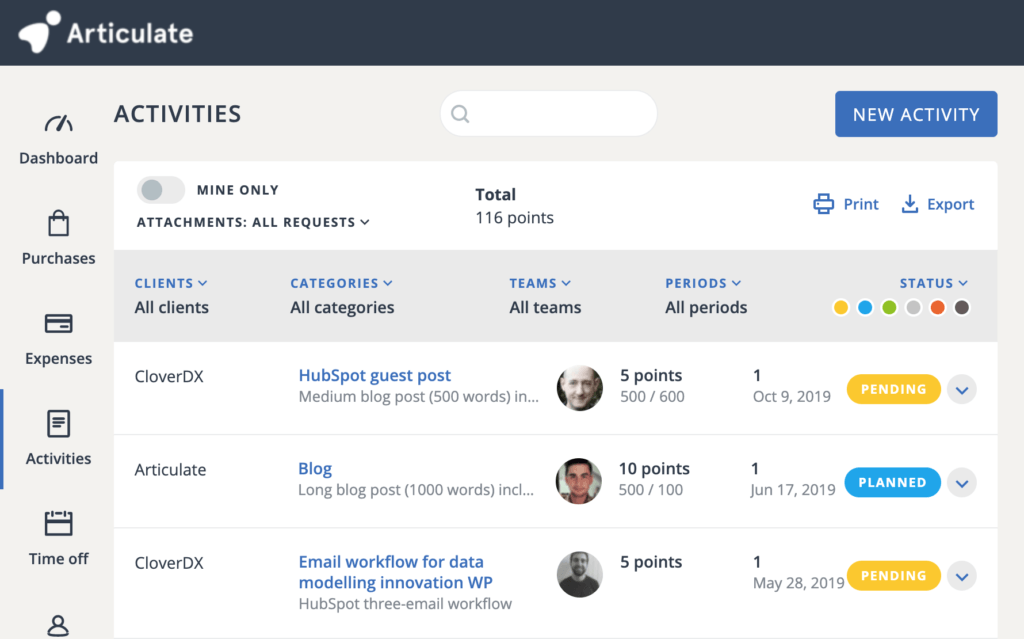
Regular check-ins
Once you let go of informal and ad-hoc communication channels, you need to be a bit more disciplined about replacing them with regular communications.
At Articulate, we start the week with a round of ‘standup meetings’ and, in my case, 1-1s with key team members. My Monday morning looks like this:
- Sales meeting
- Finance meeting
- Account managers standup
- (I don’t attend but there are also team standups)
- Company-wide standup meeting.
We use Zoom for this meetings and we have a ‘cameras on’ rule for internal meetings. Video conferencing isn’t quite the same as meeting in person but if you keep cameras on, you can get pretty close.
In the afternoon, we try to do client meetings and calls to leave the rest of the week free-ish for productive work.
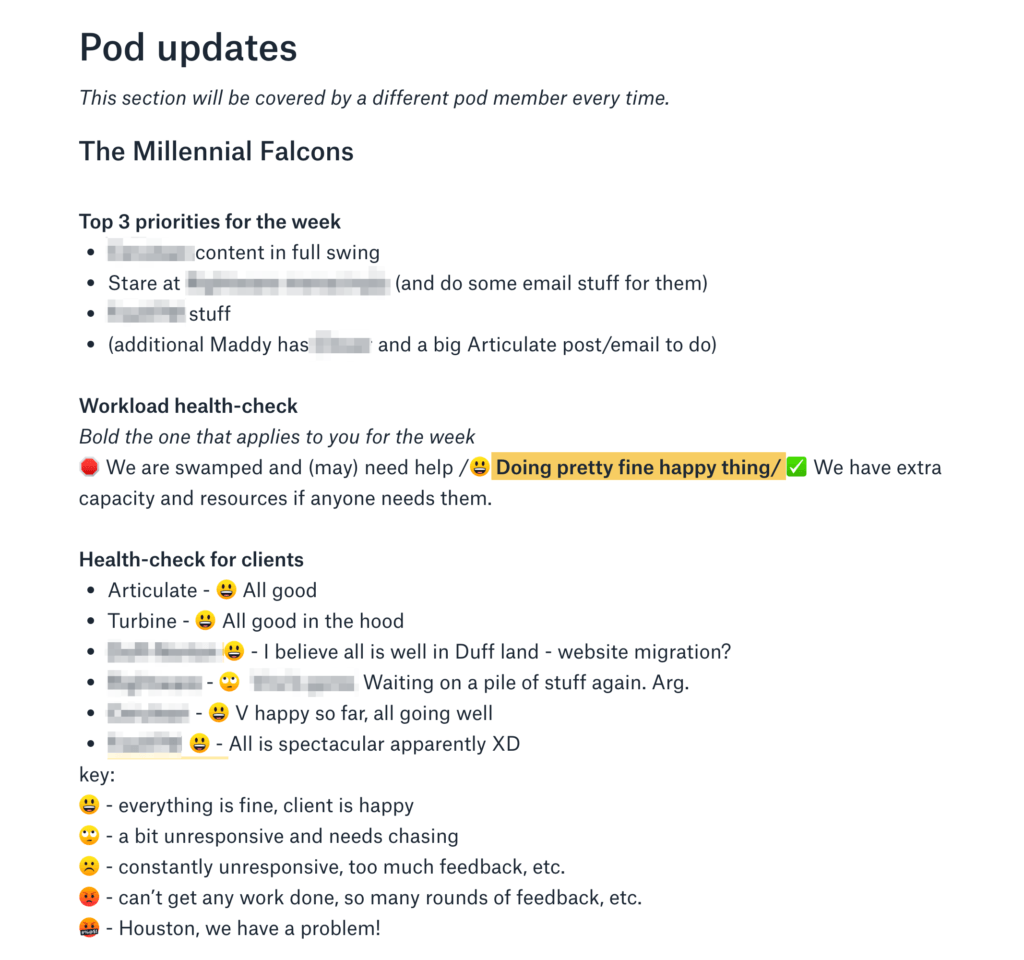
Keeping shared notes in Dropbox Paper means that everyone can refer back to decisions and updates through the week.
Live chat for high-bandwidth communication
We do most of our communications on Slack. If you are new to remote working, signing up for this or using something like Microsoft Teams is essential.
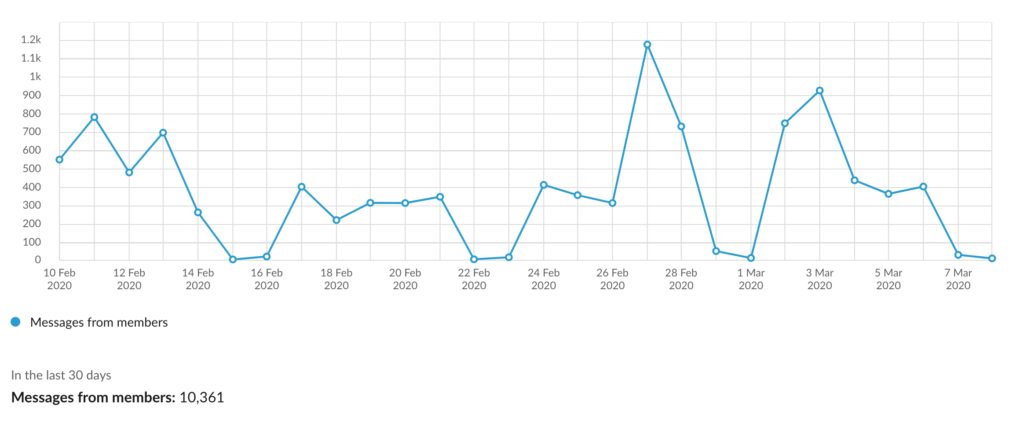
It’s a great way for people to ask those informal quick questions and keep one another updated without the interruption of a phone call or the faff of an email. Well sometimes…
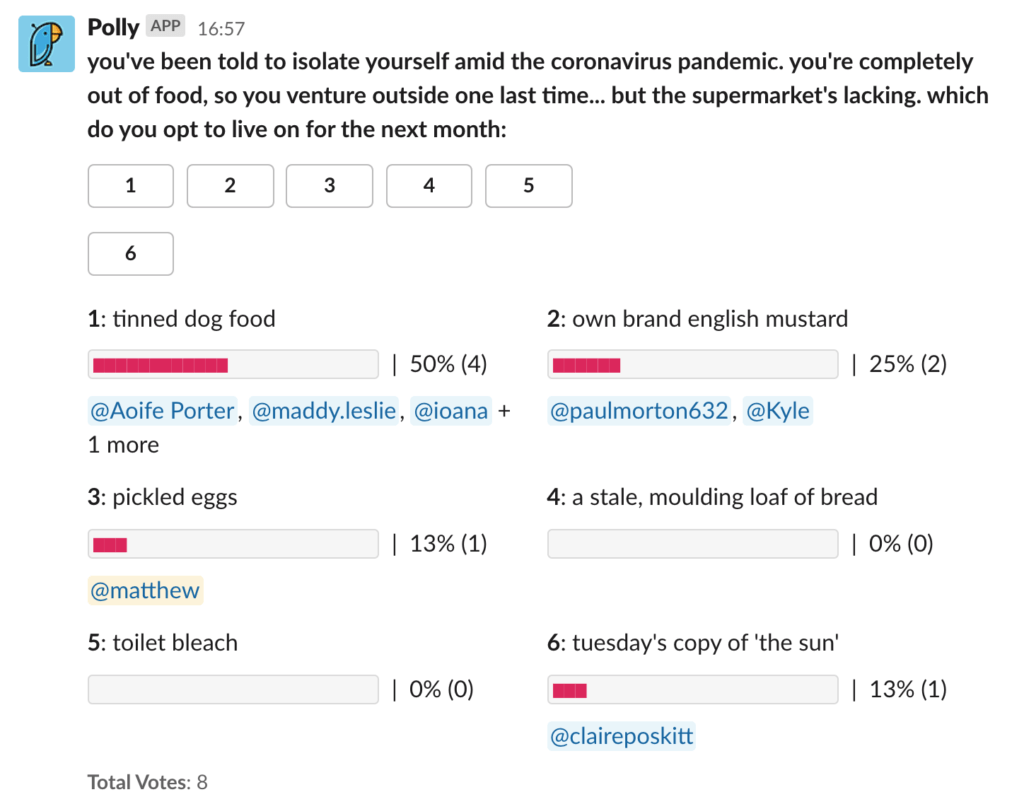
Jokes aside, I would argue that Slack gives us higher bandwidth, more responsive communications with less wasted time than most office-based companies. It’s sort of a secret weapon.
Get videoconferencing right
For videoconferencing, we use RingCentral, which is basically Zoom video conferencing. There is a strict a ‘cameras on’ rule and we have evolved a few little habits to make video conferencing work for us.
- We share agendas and minutes for nearly all our meetings using Dropbox Paper
- Most of our agendas are designed to give everyone an opportunity to speak. For example, one weekly standup starts with a minute from everyone on the call about what they’re working on and what they’re happy about.
- It’s really important to stop every 45 minutes or so to give people a break on a long call. It takes more work to concentrate and engage on a videoconference. Plus people may need coffee or a rest break or both!
- A little bit of thought about lighting, framing, headsets, background noise etc. can make the experience much better for everyone.
- Standup meetings are better if they are really short, maximum 30 minutes. It stops people (mainly me) going off at a tangent.
- There’s a very strong cultural norm that everyone turns up for video conferences on time. We usually start within a minute or two of the scheduled start time.
- Cameras on. For everyone. This is REALLY IMPORTANT.

Manage remote people with structured meetings
Without regular face to face contact, you need to invest time in getting to know people in a more structured way. For us, this means regular 1-1s and work on a shared personal development plan. This is the template for the regular meetings
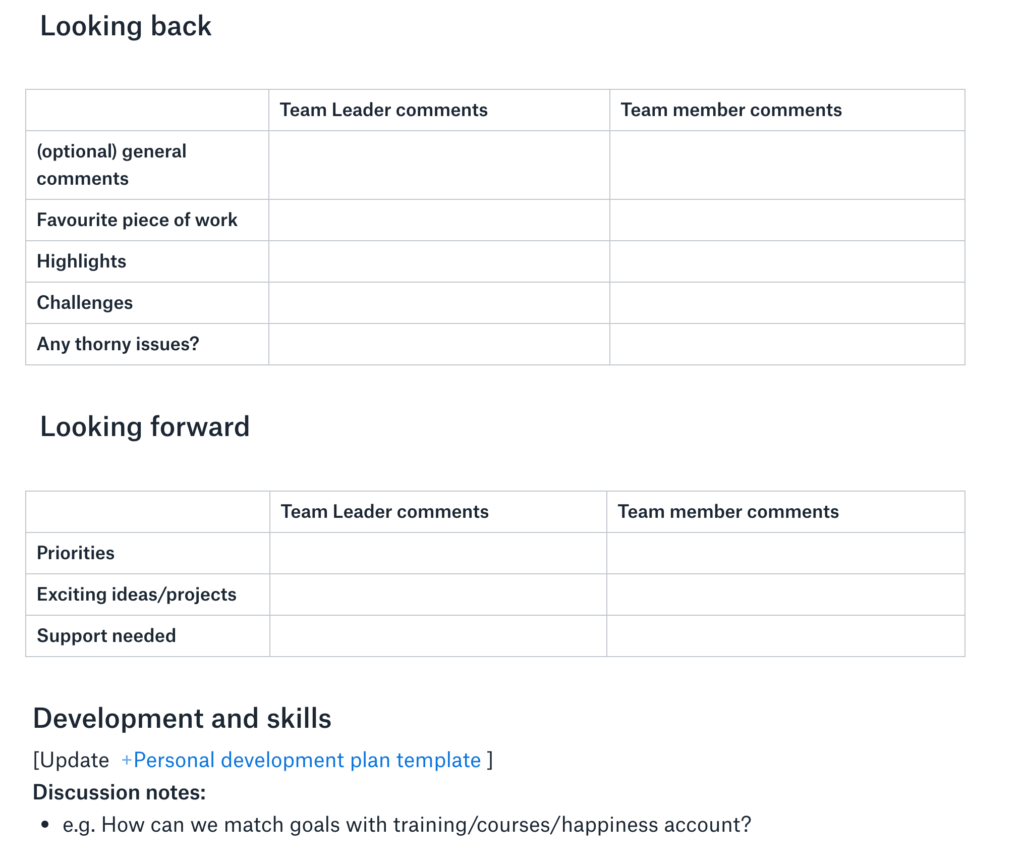
In-person meetings are important too
For 100% remote companies, it’s important to build personal and social relationships. For this reason, we try to meet all together in person 4-6 times a year. Articulate pays for all the travel and hotel costs and we usually mix workshops with social activity.
We supplement this with informal, virtual ‘happy half hours’ (which often last 3-4 hours) and ‘happy breakfasts’ and other non-work meetings. There is even a remote book club.

Of course, meeting in person is difficult in the current situation and we have just cancelled our planned meeting in April.
Take extra care of remote workers’ wellbeing
If you’re not in the same building, it’s hard to see if someone is feeling down, disengaged or looking poorly. So, remote organisations need to give more thought to this.

We give everyone a subscription to the Calm mindfulness app, and we pay for a free, confidential employee assistance programme, which can also arrange 1-1 counselling if needed. Ultimately, our commitment to employee well-being is backed by private medical insurance.
But you can’t outsource everything. So we have our own, wonderful Chief Happiness Officer. She has monthly calls with everyone with a focus on morale, engagement and helping people through the peaks and troughs of working life. She also runs our company events and does monthly surveys to give team leaders and me an anonymised overview of how we’re doing.
Companies like HealthHero (a client of ours at Articulate) can help remote working organisations with mental health and wellbeing, virtual GP access among other things. Their app, Symbio, packages health and wellbeing provision for busy HR teams with a single, streamlined app. Highly recommended.
Understand the true costs and benefits of remote working
I would argue that changing your work pattern shouldn’t just be a reaction to COVID-19, it’s a Good Thing in itself.
It’s not about the money. At Articulate, we spend more money to make remote working effectively than we save by not having an office. Our costs include:
- £30,000 a year budgeted for in-person company meetings – we hire venues, pay for meals, travel, hotels etc.
- £18 a month per person – tax-free! – for home working costs
- Phone allowance per person per month
- £840 per person per year ‘happiness account’ – a kind of personal budget to spend on things like computers, desks, chairs, training courses etc.
- Plus the salary of a part-time chief happiness officer (hello Liz!)
- We’re a Living Wage Employer and we pay that at the London rate, regardless of where people live, which increases our salary bill a bit
The benefits of remote working include:
- The ability to hire amazing people from a broader talent pool, regardless of where they live. In our last recruitment round, we had 800 applicants for three posts and we didn’t pay for advertising or agency fees. People WANT to work this way.
- Less stress and commuting for employees. Not only is this better for the environment it also gives people more personal time. The average commute in the UK accounts for an astonishing 219 hours a year. Flexible working is like giving people another couple of weeks holiday a year plus the savings in train fares or petrol.
- Better for the environment. We’re a B Corp, and we offset our carbon emissions. And so cutting down on travel not only reduces CO2 emissions but saves the company money in offsetting fees.
Articulate’s technology stack
There are lots of amazing tools out there. These are the ones we are using but your mileage may vary.
- Collaborative documents and notes: Notion
- Video capture for training and asynchronous ‘how to’ videos: Loom
- Videoconferencing: Zoom
- Project and task management: ClickUp
- Time off, purchase order and expense management: Turbine
- Remote phone system: Microsoft Teams
Set the right expectations for culture and etiquette
We have spent a lot of time over the years working on our company culture, both formally and informally. For organisations that are new to remote working, it may be a bit of a shock, and there are some cultural norms (e.g. turning up for meetings bang on time or keeping cameras on during conference calls) that are new or surprising. I’m not going to write an epic guide to company culture, but I thought it would be helpful to share our ‘Employee Guide’ which touches on a lot of the expectations and norms that help us work together.
Articulate Employee Guide
When you join Articulate, you become part of our company culture, you help to develop it, and you are an ambassador for it to people outside the company.
We want it to work for everyone, so we aim to communicate expectations and values in a way that clearly demonstrates how we conduct ourselves. Policies and procedures are important, but culture is what makes a company. So, we have written this guide to support you throughout your time with us.
Values
At Articulate, we pride ourselves on providing exceptional work and having a working culture that supports exceptional people. Our values should direct your actions and decision-making. We are:
- Collaborative
- Friendly
- Growth-driven
- Curiosity
- Resourceful
- Caring
Our working environment
Our environment is highly collaborative and focused. We are an adult environment, so we won’t micromanage you, and you can expect challenging work. You are expected to:
- Manage your time effectively
- Set your priorities and deadlines
- Be accountable for your work
- Make decisions that work for the team and our clients
Company communications
We aim to ensure that you have the information you need to do your job to a high standard. This includes understanding our values and company goals, as well as being aware of how your role can help us to achieve those objectives. To help achieve these aims, we encourage – where possible – face-to-face communication via RingCentral conference calls.
To develop and support a culture of effective communication, we will keep you updated about company developments and hold team briefings to provide details of the latest company news, initiatives and opportunities.
In return, we expect you to communicate openly and honestly with managers and colleagues alike while being as positive and constructive as possible. You are responsible for communicating on behalf of yourself, not others. Everyone has a voice at Articulate.
Working together
How you communicate should enhance the company's reputation, whether over email, telephone or face-to-face. You are responsible for acting as an ambassador for Articulate in terms of your general conduct, both within and outside the organisation.
We expect all our employees to be scrupulously impartial and honest in all affairs relating to the company and their job. At all times, be courteous, efficient and respectful in dealings with others, especially if challenging circumstances arise. Healthy debate and voicing your opinion is encouraged within the business, but once a decision is made we expect you to respect it and help to implement it.
Best behaviour
When dealing with colleagues, we feel that the following behaviours are key to having a great relationship in the workplace:
- Communicate honestly – and don’t ghost your colleagues!
- Be respectful when giving feedback – it should be constructive and help development.
- Be open to feedback – don’t take things too seriously. Feedback is a gift.
- Be an excellent colleague. Support one another.
- Listen – focus on what is being said, don’t just wait to get your point in.
- Make opportunities for everyone to speak.
- Be understanding – consider others’ workloads, personal lives, and professional experience.
- Assume positive intent.
- Show respect for everyone, from clients to colleagues. This encompasses all elements of your work including respect for others’ time, feelings and opinions.
- Be open and transparent in your communication with clients and with one another and when giving feedback. Show your working. Explain your reasons. Provide context.
Meeting etiquette
Part and parcel of a remote-working environment like ours is having regular meetings online to discuss client matters, and workload and also to keep connected to your pod and the business. We regard these in the same vein as meetings that would take place with colleagues in a typical office environment. For our culture, the act of meeting either online or in person is as important as the contents of the meetings themselves.
As such, there are certain meeting guidelines that we expect everyone to adhere to:
- Turn up on time – We are all busy, but no one person’s time is more precious than others. We do appreciate that some people do have more hectic schedules than others, but we expect you to be on a call at the time it is due to start, preferably ready to go just beforehand. If you are having issues with scheduling, let us know and we will do what we can to help!
- Attendance is key – Some meetings are mandatory: for example, company face-to-face meetings, 1-1s, weekly company stand-ups and client meetings where you have a specific contribution to make. You need a solid excuse for non-attendance, such as illness or pre-booked holiday.
- Some other meetings are not essential for work but many of them are great opportunities to get to know your colleagues better (think happy breakfasts, team check-ins), so we still view these as an important part of being an Articulate team member. So, you should have a pretty good reason for not attending and should remember to let the host know in advance if you are unable to attend.
- Be inclusive – As a good colleague or meeting host, ensure everyone has access to and is invited to relevant meetings.
- Scheduling – Consider others when planning calls and check calendars and diaries before sending a meeting invite. Be flexible both in accepting and changing meeting invites. If you can’t make a scheduled meeting, please let the host know as soon as possible.
Online communications
Aside from video calls, online forums, and especially Slack, is a key method of communication at Articulate. Slack lets us liaise with colleagues, get to know one another and share important content, like cat gifs.
Our expectations of you when using Slack (and Basecamp and email):
- Be responsive – Reply as soon as possible, even if it is a holding message to let them know that you have received the message.
- Check it – This can be used to communicate urgent messages so do make sure that you don’t miss out on anything.
- Be available – This is the primary method that people will try and get hold of you so please ensure that you check on this throughout the day.
- However, be aware that some people may be working flexible hours and so it can be expected that responses to messages in the early morning, evenings or at weekends may not be given as quickly as those sent during the standard weekday working hours.
- Where possible respect people’s communication preferences and choose the right channel for your message.
- If you don’t need a quick reply, say so.
Above all, we believe that we treat all of our employees with respect and expect everyone to be honest, considerate and supportive of their colleagues.
Hat tips: Photo by Andrew Neel on Unsplash and Tea Tomescu at Articulate for the illustration





